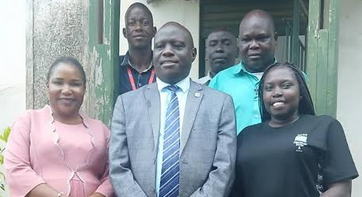The United Nations Educational, Scientific and Cultural Organization (UNESCO) on Monday held a strategic media briefing together with the Government of Western Equatoria State, in Yambio, to announce a new initiative to enhance access to information through the rehabilitation of community radio stations, including Yambio FM.
During the briefing, UNESCO Representative Doreen Loboka unveiled a comprehensive plan to support Yambio FM through equipment upgrades, studio renovation, and staff training. The initiative is part of a broader program supported by the Government of Japan to strengthen public broadcasting services in South Sudan.
“We are here to support access to information for communities and strengthen the public broadcaster. Yambio FM is one of three stations we are working to rehabilitate,” she said. “This includes studio renovations, provision of modern broadcasting equipment, and transitioning from analog to digital.”
Loboka emphasized the importance of creating a suitable working environment for media professionals and ensuring communities receive relevant and reliable content. UNESCO will also supply new transmitters and complete equipment packages to enhance transmission quality and expand coverage.
A key component of the initiative is a four-day (ongoing) intensive training for local journalists in Yambio. The program will focus on reporting in critical sectors such as agriculture, health, education, and governance.
Training facilitator Nicola Mandil said the goal is to build the capacity of radio journalists to deliver accurate and impactful content.
“Radio remains the most accessible source of information for our people. By empowering our journalists, we empower the community,” he said. “Information is power, and we must ensure the right messages reach the people, especially on topics like farming, health, education, and culture.”
Meanwhile, the state’s Minister of Local Government and Law Enforcement, Severino Morris, welcomed UNESCO’s efforts, noting the longstanding challenges Yambio FM has faced, including outdated equipment and a lack of internet access.
“This station has served Western Equatoria for years, producing talented journalists who now work across the country,” he said. “The station has struggled recently, and this support gives it a second chance. The renovation and training will help it regain its role as a key source of public information.”
He expressed gratitude to UNESCO and the Government of Japan, stating that such initiatives are crucial for rebuilding and sustaining local media institutions.
This project in Western Equatoria State is the starting point for a broader UNESCO effort to strengthen public media across South Sudan. By equipping local stations and journalists with the tools and training they need, UNESCO aims to ensure that all citizens, especially in remote areas, have access to vital information that supports development and informed decision-making.




